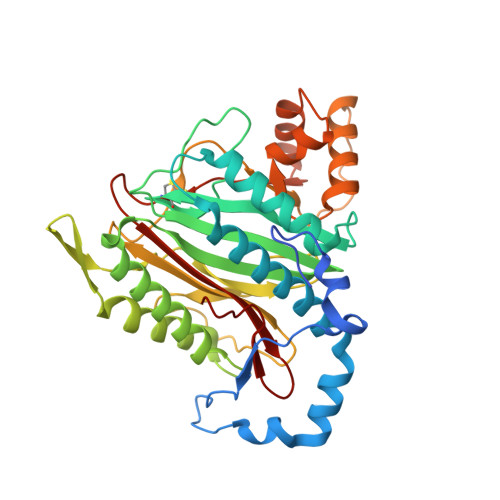Pharmacological Characterization of SDX-7320/Evexomostat: A Novel Methionine Aminopeptidase Type 2 Inhibitor with Anti-tumor and Anti-metastatic Activity.
Cornelius, P., Mayes, B.A., Petersen, J.S., Turnquist, D.J., Dufour, P.J., Dannenberg, A.J., Shanahan, J.M., Carver, B.J.(2024) Mol Cancer Ther 23: 595-605
- PubMed: 38530115
- DOI: https://doi.org/10.1158/1535-7163.MCT-23-0574
- Primary Citation of Related Structures:
8OXG - PubMed Abstract:
Methionine aminopeptidase type 2 (METAP2) is a ubiquitous, evolutionarily conserved metalloprotease fundamental to protein biosynthesis which catalyzes removal of the N-terminal methionine residue from nascent polypeptides. METAP2 is an attractive target for cancer therapeutics based upon its over-expression in multiple human cancers, the importance of METAP2-specific substrates whose biological activity may be altered following METAP2 inhibition, and additionally, that METAP2 was identified as the target for the anti-angiogenic natural product, fumagillin. Irreversible inhibition of METAP2 using fumagillin analogues has established the anti-angiogenic and anti-tumor characteristics of these derivatives; however, their full clinical potential has not been realized due to a combination of poor drug-like properties and dose-limiting central nervous system (CNS) toxicity. This report describes the physicochemical and pharmacological characterization of SDX-7320 (evexomostat), a polymer-drug conjugate of the novel METAP2 inhibitor (METAP2i) SDX-7539. In vitro binding, enzyme, and cell-based assays demonstrated that SDX-7539 is a potent and selective METAP2 inhibitor. In utilizing a high molecular weight, water-soluble polymer to conjugate the novel fumagillol-derived, cathepsin-released, METAP2i SDX-7539, limitations observed with prior generation, small molecule fumagillol derivatives were ameliorated including reduced CNS exposure of the METAP2i, and prolonged half-life enabling convenient administration. Multiple xenograft and syngeneic cancer models were utilized to demonstrate the anti-tumor and anti-metastatic profile of SDX-7320. Unlike polymer-drug conjugates in general, reductions in small molecule-equivalent efficacious doses following polymer conjugation were observed. SDX-7320 has completed a phase I clinical safety study in patients with late-stage cancer and is currently being evaluated in multiple phase Ib/II clinical studies in patients with advanced solid tumors.
Organizational Affiliation:
SynDevRx, Inc., Cambridge, Massachusetts.
















